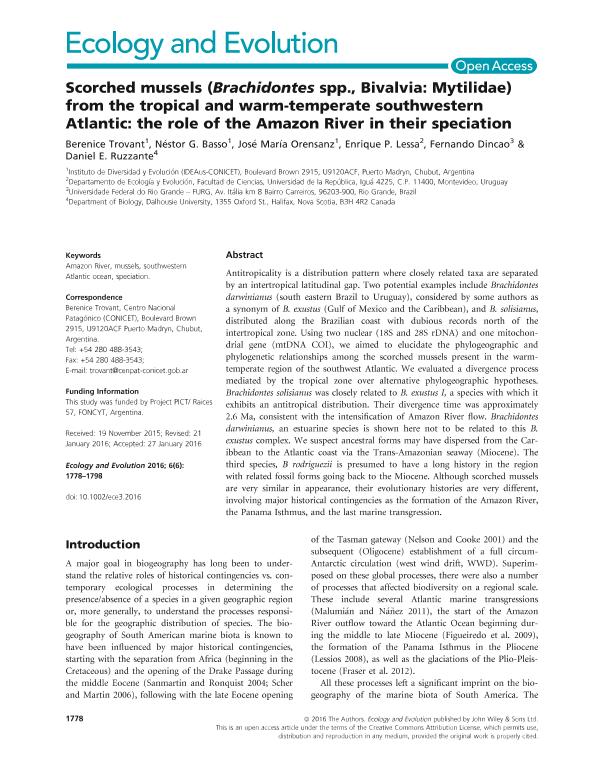Mostrar el registro sencillo del ítem
dc.contributor.author
Trovant, Berenice

dc.contributor.author
Basso, Nestor Guillermo

dc.contributor.author
Orensanz, Jose Maria

dc.contributor.author
Lessa, Enrique P.

dc.contributor.author
Dincao, Fernando
dc.contributor.author
Ruzzante, Daniel E.

dc.date.available
2018-02-21T20:51:23Z
dc.date.issued
2016-03-18
dc.identifier.citation
Trovant, Berenice; Basso, Nestor Guillermo; Orensanz, Jose Maria; Lessa, Enrique P.; Dincao, Fernando; et al.; Scorched mussels (Brachidontes spp., Bivalvia: Mytilidae) from the tropical and warm-temperate southwestern Atlantic: the role of the Amazon River in their speciation; John Wiley and Sons Ltd; Ecology and Evolution; 6; 6; 18-3-2016; 1778-1798
dc.identifier.issn
2045-7758
dc.identifier.uri
http://hdl.handle.net/11336/36929
dc.description.abstract
Antitropicality is a distribution pattern where closely related taxa are separated by an intertropical latitudinal gap. Two potential examples include Brachidontes darwinianus (south eastern Brazil to Uruguay), considered by some authors as a synonym of B. exustus (Gulf of Mexico and the Caribbean), and B. solisianus, distributed along the Brazilian coast with dubious records north of the intertropical zone. Using two nuclear (18S and 28S rDNA) and one mitochondrial gene (mtDNA COI), we aimed to elucidate the phylogeographic and phylogenetic relationships among the scorched mussels present in the warm-temperate region of the southwest Atlantic. We evaluated a divergence process mediated by the tropical zone over alternative phylogeographic hypotheses. Brachidontes solisianus was closely related to B. exustus I, a species with which it exhibits an antitropical distribution. Their divergence time was approximately 2.6 Ma, consistent with the intensification of Amazon River flow. Brachidontes darwinianus, an estuarine species is shown here not to be related to this B. exustus complex. We suspect ancestral forms may have dispersed from the Caribbean to the Atlantic coast via the Trans-Amazonian seaway (Miocene). The third species, B rodriguezii is presumed to have a long history in the region with related fossil forms going back to the Miocene. Although scorched mussels are very similar in appearance, their evolutionary histories are very different, involving major historical contingencies as the formation of the Amazon River, the Panama Isthmus, and the last marine transgression.
dc.format
application/pdf
dc.language.iso
eng
dc.publisher
John Wiley and Sons Ltd
dc.rights
info:eu-repo/semantics/openAccess
dc.rights.uri
https://creativecommons.org/licenses/by-nc-sa/2.5/ar/
dc.subject
Amazon River
dc.subject
Mussels
dc.subject
Southwestern Atlantic Ocean
dc.subject
Speciation
dc.subject.classification
Otras Ciencias Biológicas

dc.subject.classification
Ciencias Biológicas

dc.subject.classification
CIENCIAS NATURALES Y EXACTAS

dc.title
Scorched mussels (Brachidontes spp., Bivalvia: Mytilidae) from the tropical and warm-temperate southwestern Atlantic: the role of the Amazon River in their speciation
dc.type
info:eu-repo/semantics/article
dc.type
info:ar-repo/semantics/artículo
dc.type
info:eu-repo/semantics/publishedVersion
dc.date.updated
2018-02-15T16:55:47Z
dc.journal.volume
6
dc.journal.number
6
dc.journal.pagination
1778-1798
dc.journal.pais
Reino Unido

dc.description.fil
Fil: Trovant, Berenice. Consejo Nacional de Investigaciones Científicas y Técnicas. Centro Científico Tecnológico Conicet - Centro Nacional Patagónico. Instituto de Diversidad y Evolución Austral; Argentina
dc.description.fil
Fil: Basso, Nestor Guillermo. Consejo Nacional de Investigaciones Científicas y Técnicas. Centro Nacional Patagónico; Argentina
dc.description.fil
Fil: Orensanz, Jose Maria. Consejo Nacional de Investigaciones Científicas y Técnicas. Centro Nacional Patagónico; Argentina
dc.description.fil
Fil: Lessa, Enrique P.. Facultad de Ciencias, Universidad de la República; Uruguay
dc.description.fil
Fil: Dincao, Fernando. Universidade Federal do Rio Grande do Sul; Brasil
dc.description.fil
Fil: Ruzzante, Daniel E.. Dalhousie University Halifax; Canadá
dc.journal.title
Ecology and Evolution
dc.relation.alternativeid
info:eu-repo/semantics/altIdentifier/doi/http://dx.doi.org/10.1002/ece3.2016
Archivos asociados
